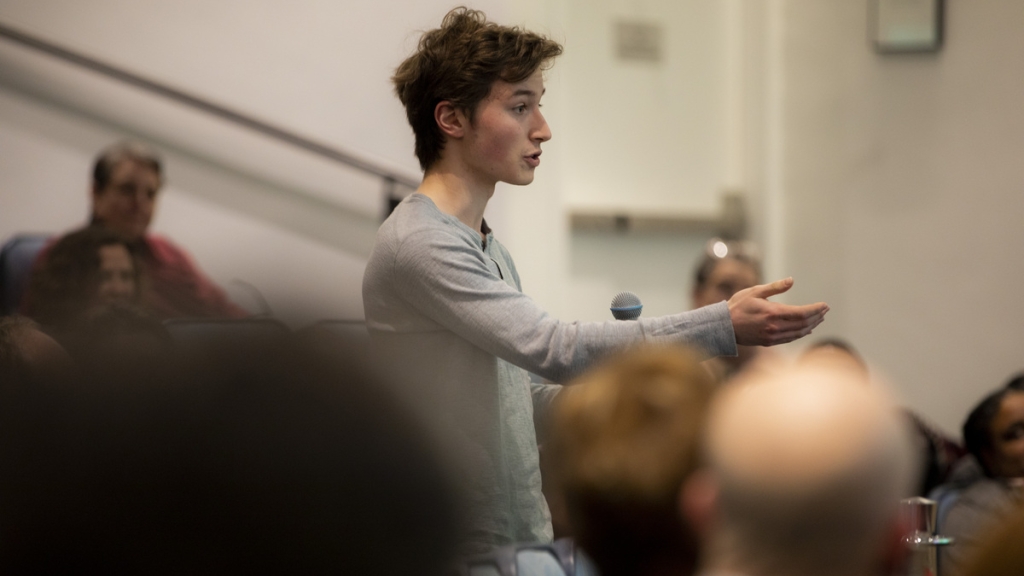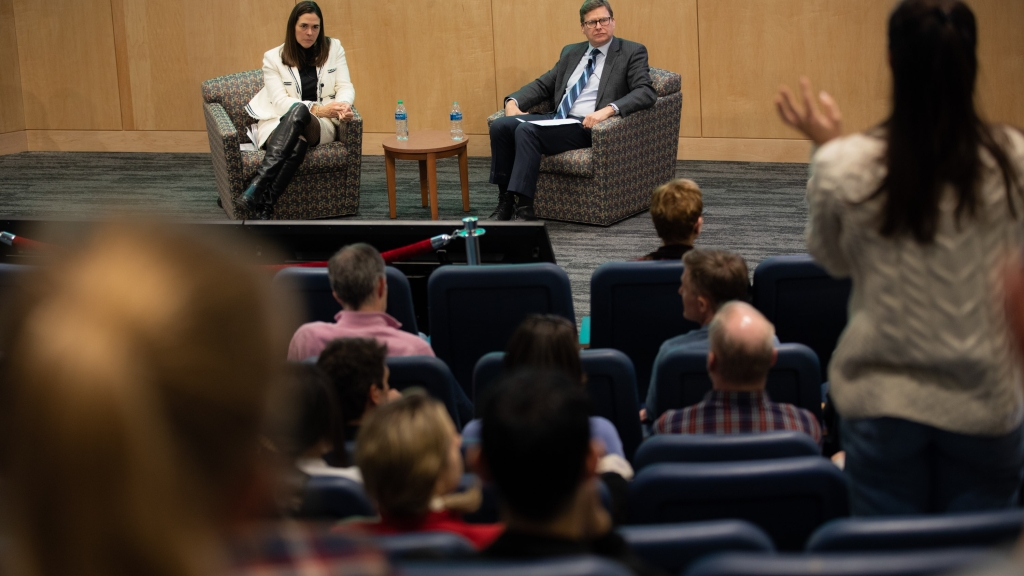President Sian Leah Beilock was at the Tuck School of Business on Tuesday evening to participate in a wide-ranging discussion of leadership challenges in higher education, from freedom of speech on campus to communication during times of crisis.
"I have a lot of faith in institutions of higher education. I don't think we get everything right, but this is the ground zero of where it should happen," President Beilock told the crowd of MBA students, faculty, and staff, responding to a question about how to push back on the polarizing rhetoric that has shaped much of the national discourse in recent years.
The event in Cook Auditorium was one of a series of conversations Tuck is hosting as part of Dartmouth Dialogues, an institution-wide effort to cultivate opportunities for faculty, students, and staff to engage in crucial conversations with each other around challenging and controversial issues. The event, which drew 110 people, was co-sponsored by Institutional Diversity and Equity.
Beilock was joined by Charles Wheelan '88, who co-leads the Tuck series with Dia Draper, assistant dean for diversity, equity, and inclusion at Tuck, and Vincent Mack, Tuck's director of intercultural leadership and student life.
During the conversation, Wheelan, an adjunct professor of business administration, posed questions—some submitted in advance by Tuck students—and moderated a Q&A with members of the audience.
"Part of successfully holding crucial conversations is listening and having the capacity to change one's mind," Wheelan said, asking Beilock for an example of an issue on which she had changed her mind significantly.
"The announcement we made yesterday around bringing back the SAT and ACT is a good example," Beilock said, referring to Dartmouth's decision this week to once again require undergraduate applicants to submit standardized test scores. The requirement had been suspended during the height of the COVID-19 pandemic.
Beilock, a cognitive scientist, is an expert on performance under stress. She said she had long understood some of the negative impacts of the pressure associated with standardized testing. But data from Dartmouth's own faculty experts showed important benefits to using scores as one part of a student's overall application.
"The data showed that the SAT can be an important predictor, one of many, in how students will complement Dartmouth," she said. "But what is the most interesting, I think, was that the researchers found that in a test-optional environment, we were not giving people enough information about how we do admissions, so students who are lower-income often decide not to submit their test scores"—even when it might be to their advantage to do so.
"I believe our goal is academic excellence for the purpose of educating the widest swath of leaders for our society," Beilock said. "And it's clear to me that test scores could be one more tool in our toolbox to make sure that we will bring the best and brightest regardless of background. That was a place where I really changed my mind."
In response to a question about what Dartmouth should do to encourage an ethos of free expression on campus, Beilock connected the issue to another institutional priority: mental health and how students can cultivate psychological resilience.

Luke Montalbano '27 asks a question at the Tuck forum. (Photo By Laura DeCapua)
Having meaningful conversations with people who fundamentally disagree with our views can be uncomfortable, she said. "I believe it's very hard to put ourselves in uncomfortable situations when we're not thinking about our own health and wellness and we don't have the resources to focus on that. And so this is front and center for us at Dartmouth. We're hiring a new chief health and wellness officer to think about this across the institution."
Asked how individuals can translate the principles of free expression and open dialogue into everyday life, Beilock admitted that it is challenging, and requires cultivating trust and community.
"I think about this every day as a leader," she said. "Asking questions is a great way to engage on a particular issue. And listening, a lot. It takes cognitive effort to sit back and listen. Our emotions come up, and we have reactions. A huge part of managing that is being able to label them. And by the way, it takes cognitive effort, like driving and talking on a cell phone. I used to teach this in my cognitive psychology classes—that's why if you get lost, you turn down the radio and stop talking so you can concentrate."
So how to cope with the cognitive load that challenging conversations provoke?
"Psychological research shows the way to deal with difficult situations is practice," Beilock said.
In addition to the speaker series, Tuck's conversations project includes an intercultural leadership seminar; so-called "Green Table Talks," panel discussions in which community members can engage on timely issues; small group dinners for students, faculty, and guest experts to explore hot-button topics; and skill-building workshops on collaborative dialogue, emotional intelligence, organization behavior, and more.
